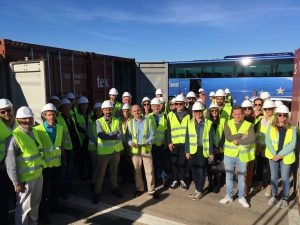
Port Authority, Customs and Plant Health offer their experience to the TREE group of EU, US and Australian authorities.
More than 40 international representatives of timber trade regulators gather in Valencia.
Valencia, October the 24th 2017. – Valencia and the Port of Valencia have been added to the list of capitals and institutions in the world that offer their experience, facilities and international projection to find the final formula to end illegal felling on any continent and its subsequent commercialization. This is one of the threats facing some developing countries whose environmental, social and economic consequences end up creating problems around the world.
In order to determine how the phytosanitary inspection, customs and Port Authority act in the control of timber trade , this morning, representatives of the public administrations of the United States, Australia and several countries of the European Union, all of them, members of TREE; the Timber Regulation Enforcement Exchanger (LOG) group of law enforcement agencies.
Raúl Cascajo, representing the Port Authority of Valencia; Marta Catalán of Customs and Javier Collado of the Inspection of Plant Health have exposed to the large international representation how Valenciaport acts in environmental matters and in all matters related to documentary, fiscal and sanitary inspection of imports and exports of timber.
TREE representatives have visited the sanitary inspection of Valenciaport and have been able to view different containers loaded with samples of different types of timber in the inspection post of Noatum Terminal.
“The port of Valencia” – have explained several international representatives – is of great importance for its size, the traffic size and the scope of its commercial activity and Also for its environmental commitment and the professionalism of its inspections. It has been very useful to see and be able to touch the containers, the packaging, the actual documentation at crane foot, and to be able to check on reality, when imports and exports indications are fulfilled and when they are not.”
Illegal tree jogging is responsible for problems of deforestation, global warming and numerous fires. Behind this illegal practice arise groups of organized delinquency, bribes, conflicts between countries and civil wars, as denounced by the European Parliament since 2005.
In order to end this social and environmental scourge, the European Union has been working with different measures since 2003, through the EU Action Plan for Forest Law Enforcement, Governance and Trade (FLEGT) and of the EUTR rules (European Union Timber Regulation).
Known as FLEGT regulations, Regulations (EC) Nº 2173/2005 and Nº 1024/2008 establish a FLEGT licensing scheme for imports of wood and certain derived products from countries with which it has previously been signed a Voluntary Association Agreement (AVA). The purpose of these agreements is to ensure that all wood exported meets the legal requirements of the country where it is harvested, while at the same time improving the forest governance of these countries.
By contrast, EUTR identifies the one developed by Regulation (EU) Nº 995/2010, which imposes obligations on agents marketing wood and wood products on the Community market, directly applicable from March the 3rd, 2013. This rule prohibits trading in the European Union of illegally harvested timber and its derivative products.
The representatives of TREE will study during the three days that will remain in Valencia the possibilities of introducing in the usual procedures of the ports (customs, phytosanitary inspection, treasury, etc.) the controls or the identifiers that allow to fight against the scourge of the timber trade and their derived from illegal felling.

